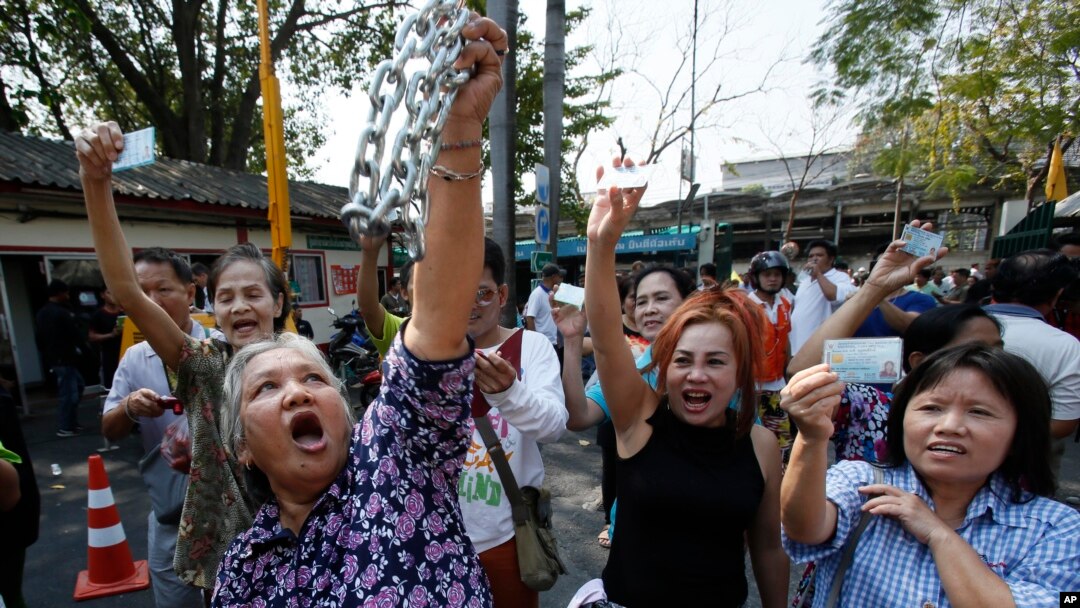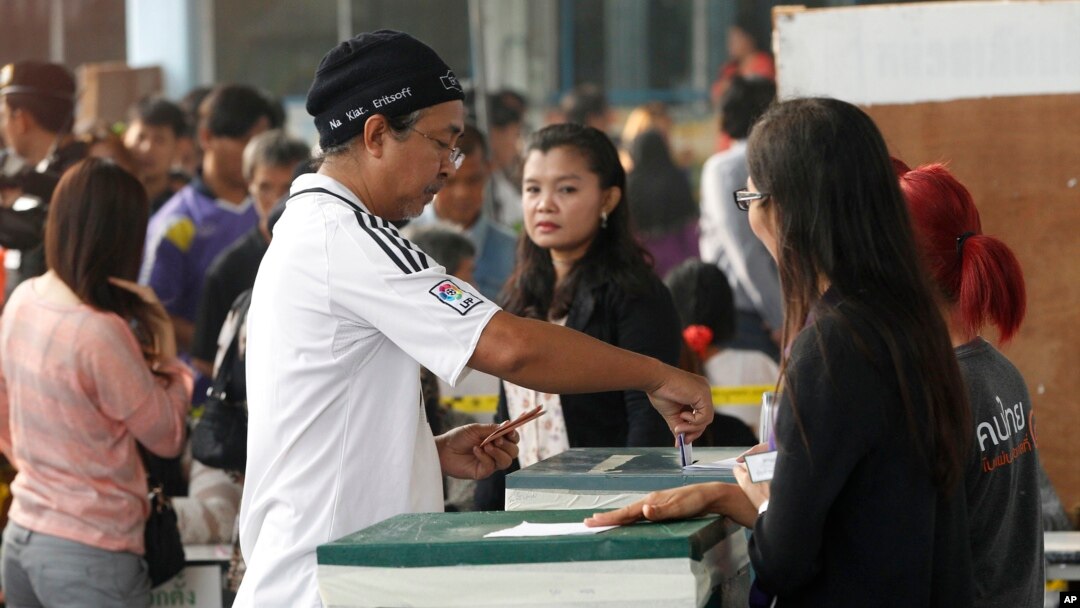BANGKOK —
Polls have closed in Thailand's tense national elections in which anti-government protesters forced the closure of hundreds of polling stations in the capital, Bangkok.
Voters have braved intimidation and threats of violence to participate in nationwide elections. Protesters forced elections to be canceled in nine of Thailand's 76 provinces and four of Bangkok's 50 districts, but most polling stations were able to open.
Angry voters pound on the gates of one Bangkok district office demanding they be allowed to vote.
Anti-government protesters here earlier blocked officials from delivering ballots to nearby polling stations.
2006: Army overthrows Prime Minister Thaksin Shinawatra
2007: The pro-Thaksin People Power Party wins elections
2008: Anti-Thaksin protesters, known as "Yellow Shirts", stage months of demonstrations and briefly paralyze airports. Abhisit Vejjajiva becomes prime minister.
2010: Massive pro-Thaksin "Red Shirt" protests are held in Bangkok, dozens are killed
2011: Yingluck Shinawatra, sister of Thaksin, elected prime minister
2013: Anti-government protesters hold massive demonstrations, Ms. Yingluck calls new elections
2014: Protesters camp in Bangkok to shut down the city
Voter Thippawan Sae-lao blamed election organizers for failing to protect her democratic right.
She says she feels disappointed because she could not cast her vote. They should have been well prepared, she says, because they already knew people would come out to vote.
Well-known independent politician Chuwit Kamolvisit was assaulted when he arrived at the empty polling station in his own neighborhood.
A few protesters splashed water at Chuwit, knocked him down, and pulled his shirt, but were quickly subdued by his security.
Chuwit, a massage parlor king turned anti-corruption advocate, says both the ruling party and opposition are to blame for Thailand's deep divisions.
“They have a conflict now. And, next year it's going to be a new conflict," said Chuwit. "Until they learn that the conflict have to be solved with the compromise, that is a politic. Politic(s) is a compromise, man. If not compromise, war.”
But protesters failed to stop the election itself and throughout most of Bangkok, and the rest of Thailand, ballots were delivered and voting took place with few incidents.

After polls closed Sunday, Thailand's Election Commission on national television said 89% of the country's 93,000 polling stations were able to open.
Commission chairman Supachai Somcharoen repeated the commission's opposition to holding the election during the current unrest but also thanked voters for participating.
He says they are studying the laws and regulations to set February 23rd as a new election date for eligible voters who could not cast their ballots during early voting on January 26th.
Protesters that day blocked voting at nearly all of Bangkok's districts in scenes that led many to question their commitment to democracy.
Despite their failure to stop the election, protesters, who want an un-elected council to take over to usher in unspecified reforms, were in a celebratory and defiant mood.
Protesters danced to live music at Bangkok's Victory Monument, one of several protest sites in the city.
Paengporn Kunork says they want Prime Minister Yingluck Shinawatra and her family, who they say are corrupt, out of Thai politics.
She says they are celebrating as if they won because they are gradually winning, step by step. But their ultimate goal, she says, is to force the prime minister to reform and then they can start to reform the country.
After Sunday’s vote, attention turns to legal challenges to the ruling party in the courts in the coming weeks, and by-elections in the coming months.
Despite months of turmoil, Thailand’s political standoff shows no signs of nearing an end.
Voters have braved intimidation and threats of violence to participate in nationwide elections. Protesters forced elections to be canceled in nine of Thailand's 76 provinces and four of Bangkok's 50 districts, but most polling stations were able to open.
Angry voters pound on the gates of one Bangkok district office demanding they be allowed to vote.
Anti-government protesters here earlier blocked officials from delivering ballots to nearby polling stations.
Political Developments in Thailand
Political Developments in Thailand2006: Army overthrows Prime Minister Thaksin Shinawatra
2007: The pro-Thaksin People Power Party wins elections
2008: Anti-Thaksin protesters, known as "Yellow Shirts", stage months of demonstrations and briefly paralyze airports. Abhisit Vejjajiva becomes prime minister.
2010: Massive pro-Thaksin "Red Shirt" protests are held in Bangkok, dozens are killed
2011: Yingluck Shinawatra, sister of Thaksin, elected prime minister
2013: Anti-government protesters hold massive demonstrations, Ms. Yingluck calls new elections
2014: Protesters camp in Bangkok to shut down the city
She says she feels disappointed because she could not cast her vote. They should have been well prepared, she says, because they already knew people would come out to vote.
Well-known independent politician Chuwit Kamolvisit was assaulted when he arrived at the empty polling station in his own neighborhood.
A few protesters splashed water at Chuwit, knocked him down, and pulled his shirt, but were quickly subdued by his security.
Chuwit, a massage parlor king turned anti-corruption advocate, says both the ruling party and opposition are to blame for Thailand's deep divisions.
“They have a conflict now. And, next year it's going to be a new conflict," said Chuwit. "Until they learn that the conflict have to be solved with the compromise, that is a politic. Politic(s) is a compromise, man. If not compromise, war.”
But protesters failed to stop the election itself and throughout most of Bangkok, and the rest of Thailand, ballots were delivered and voting took place with few incidents.

Voters hold their identification cards and the chains that held the gate of the polling station closed, as they demand the right to vote during general elections in Bangkok, Thailand, Feb. 2, 2014.
At polling stations, police and soldiers were dispatched to maintain order, though neither used force.After polls closed Sunday, Thailand's Election Commission on national television said 89% of the country's 93,000 polling stations were able to open.
Commission chairman Supachai Somcharoen repeated the commission's opposition to holding the election during the current unrest but also thanked voters for participating.
He says they are studying the laws and regulations to set February 23rd as a new election date for eligible voters who could not cast their ballots during early voting on January 26th.
Protesters that day blocked voting at nearly all of Bangkok's districts in scenes that led many to question their commitment to democracy.
Despite their failure to stop the election, protesters, who want an un-elected council to take over to usher in unspecified reforms, were in a celebratory and defiant mood.
Protesters danced to live music at Bangkok's Victory Monument, one of several protest sites in the city.
Paengporn Kunork says they want Prime Minister Yingluck Shinawatra and her family, who they say are corrupt, out of Thai politics.
She says they are celebrating as if they won because they are gradually winning, step by step. But their ultimate goal, she says, is to force the prime minister to reform and then they can start to reform the country.
After Sunday’s vote, attention turns to legal challenges to the ruling party in the courts in the coming weeks, and by-elections in the coming months.
Despite months of turmoil, Thailand’s political standoff shows no signs of nearing an end.


